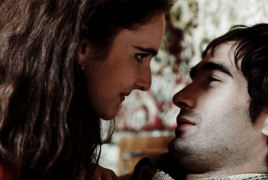Georgia’s “Dede” anthropologically fascinating debut: review July 11, 2017 - 11:11 AMT PanARMENIAN.Net - If there is an emblematic image in contemporary Georgian cinema, it might well be of khaki-clad men with rifles casually slung over their shoulders, clustered around a scuffed, scarred truck on a mountain road. But while just such an image greets us at the opening of debut director Mariam Khatchvani’s “Dede” it’s misleading in two ways: The war it details is fought not between nations or political ideologies, but between women and men, and its frontline is a battle between tradition and progress, the Variety review said. The broken-down truck of the opening scene is almost the last we’ll see of the recognizably modern world: the two men inside it are heading back home from the war, but they might as well be heading back in time. Gegi (George Babluani, “13 Tzameti”) and David (Nukri Khatchvani) are returning from the front to the tiny community of Ushguli in the remote region of Svaneti, which has its own dialect and arcane customs, high in the harsh but spectacular terrain of the Greater Caucasus mountains, which is captured in Konstantin Mindia Esadze’s attractively grainy, antique-style photography. David, whose life Gegi saved during the conflict, is about to marry his fiancée; Gegi hopes to find the girl he fell for without ever knowing her name. In the first of several not terribly surprising turns (the film is anthropologically fascinating but dramaturgically simplistic), Gegi’s paramour and David’s bride-to-be turn out to be the same person, Dina (Natia Vibliani). She reciprocates Gegi’s love, but is promised to David, and her staunchly traditionalist grandfather will not hear of her breaking her engagement, as it would bring dishonor on the family and blood would be shed. Blood is duly shed, though not in the expected manner: David commits suicide and after a makeshift tribunal clears Gegi of any malfeasance in that regard, he marries Dina and takes her home to his village, where they have a child. But there is a karmic inevitability to the fact that a marriage begun under such an ill star cannot last forever, and five years later Gegi is killed after going on an errand of mercy. The grief-stricken Dina is once again chattel. Her childhood friend Girshel has always loved her, apparently, and proves it by demanding that her father-in-law surrender his claim on her, marrying her against her will and separating her from her beloved little son. As the old saying goes: If you can’t be with the one you love (because he died in a blood feud), love the one you’ve been forced to marry under threat of violence. This is a lot of story for 96 minutes, but story is not the exceptional thing here. Khatchvani hails from the same region of Georgia depicted in the film and brings an insider’s eye to the details of everyday Ushguli life. It is a place of intoxicatingly strange rituals — Girshel announces his de facto kidnapping of Dina by tossing a bullet wrapped in black cloth into Gegi’s father’s yard; the village elders who discuss Gegi’s role in David’s suicide hold court in a sort of grotto with an icon of St. George as a hallowed artifact; Gegi’s sister is at one point bodily bundled into a waiting car and told that from now on she is not to leave the house of the man who has decided (to employ modern slang that feels oddly appropriate here) to “wife her.” It could be a companion piece to “The Handmaid’s Tale,” except that these things do not belong to some fictional dystopia; they really happened, and occasionally happen still. With Dina trapped in this hostile environment, her gestures toward self-determination are a menace to the ancient ways — which is even more galling because those gestures are such tiny ones. Dina is no revolutionary hero and has no desire to undermine her village culture, or even to escape it. In this way, “Dede” is a more conservative film than many comparable stories of women rebelling against their traditionalist cultures, such as Laura Bispuri’s “Sworn Virgin.” In fact, it has a kind of 1930s weepie structure: a romantic melodrama with Dina as a wool-wrapped Scarlett O’Hara, trapped between men and desiring only the power to choose between them, and not any further independence. So although it’s engrossing in its authentic exploration of a largely unknown microculture, Khatchvani’s debut also feels a little timid. Somewhere in there, there’s a mightier version, hinted at in one exhilarating scene, as Dina, dressed like a warrior woman, gallops her horse to the finish line of a race. It’s the film’s most liberating and liberated moment, and it reminds us that there’s no such thing as being a little bit free, the review said. Related links: The creative crew of the Public TV had chosen 13-year-old Malena as a participant of this year's contest. She called on others to also suspend their accounts over the companies’ failure to tackle hate speech. Penderecki was known for his film scores, including for William Friedkin’s “The Exorcist”, Stanley Kubrick’s “The Shining”. The festival made the news public on March 19, saying that “several options are considered in order to preserve its running” Partner news |